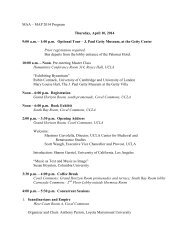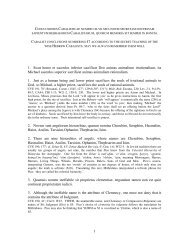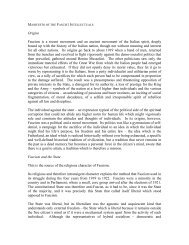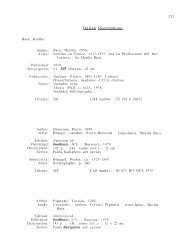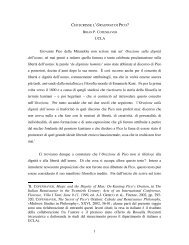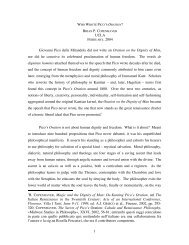1 (1) Pythagoras of Samos instructed the region of Italy once called ...
1 (1) Pythagoras of Samos instructed the region of Italy once called ...
1 (1) Pythagoras of Samos instructed the region of Italy once called ...
Create successful ePaper yourself
Turn your PDF publications into a flip-book with our unique Google optimized e-Paper software.
form, <strong>the</strong> soul is drawn out into a cone as it floats down, just as a line comes from a point<br />
and extends into a length from an undivided source; and <strong>the</strong>n from its point, which is a<br />
monad, <strong>the</strong> soul comes here into <strong>the</strong> dyad, which is <strong>the</strong> first extension; and this is <strong>the</strong><br />
essence that Plato <strong>called</strong> undivided and likewise divided in <strong>the</strong> Timaeus, when speaking<br />
about <strong>the</strong> structure <strong>of</strong> <strong>the</strong> world-soul.’ Again: ‘Therefore, if we will admit that trees are<br />
indeed moved, but with a movement suited to <strong>the</strong>m, why would we deny this to <strong>the</strong> soul –<br />
that it is moved with a motion appropriate to its essence?’ 123<br />
(13) Look at all <strong>the</strong> words we use up in order to know which word to use – ‘substance’ or<br />
‘essence’ – because <strong>of</strong> <strong>the</strong> perversity <strong>of</strong> certain people! What shall we do, <strong>the</strong>n? If we<br />
prefer ‘substance,’ we seem to stray far<strong>the</strong>r from <strong>the</strong> correct Greek and also to banish<br />
‘essence’ as a word which is empty and useless (and good riddance). But if we prefer<br />
‘essence,’ we shall depart from usage already accepted (to which some c<strong>once</strong>ssion must<br />
be made). And whichever way we choose, we shall still stumble upon <strong>the</strong> confusions <strong>of</strong><br />
language that I have pointed out. (14) Therefore, in order to allow both truth and usage<br />
each to play its part, so that we may speak more distinctly and more clearly as well, we<br />
must, in my view, say ‘substance’ when speaking about a thing composed <strong>of</strong> those two<br />
principles (as Aristotle would say). When speaking about what he calls ‘matter,’ we<br />
should call it ‘essence’; and if we ever need to cite some Greek author, we will make use<br />
<strong>of</strong> <strong>the</strong> Greek word in <strong>the</strong> way that we have done. ‘Form,’ however, we understand to be<br />
quality. 124<br />
These are issues that we must discuss in what follows. This being so, <strong>the</strong> first category<br />
(as Boethius liked) should be <strong>called</strong> ‘substance.’ 125 For a body is composed <strong>of</strong> matter and<br />
form, or <strong>of</strong> essence and quality, and it must be aknowledged that soul is likewise<br />
composed, although we will have something to say about this as well.<br />
7 THE CLASSIFICATION OF SUBSTANCE: AGAINST PORPHYRY AND OTHERS<br />
Porphyry – a man <strong>of</strong> great authority and very learned, if we believe Boethius – did what<br />
most people did and classified ‘substance’ into ‘bodily’ and ‘bodiless.’ Since it is a<br />
category, ‘substance’ is treated as <strong>the</strong> highest genus, while ‘bodily’ and ‘bodiless’ are<br />
said to be differences, always arranged in pairs. When <strong>the</strong>se differences are reduced to<br />
substantives, <strong>the</strong>y make species, as when ‘body’ is made out <strong>of</strong> ‘bodily.’ But ‘bodiless’<br />
did not get a substantive <strong>of</strong> its own in <strong>the</strong>ir scheme, though by my reckoning it will be<br />
‘spirit’ or ‘soul.’ (2) ‘Body’ is nothing but ‘bodily substance,’ however, and ‘spirit’ or<br />
‘soul’ is ‘bodiless substance.’ When ‘body,’ which is a species <strong>of</strong> ‘substance,’ is<br />
123<br />
Zippel cites Macrob. Somn. 1.12.5-6; 2.15.9, 12, 16.17.<br />
124<br />
For substance in Aristotle as a composite <strong>of</strong> two principles, matter and form, see above, 6.7; <strong>the</strong> Greek<br />
word <strong>of</strong> which Valla will make use is ousia, transliterated as usia.<br />
125<br />
Zippel cites Boethius, In Porphyrium dialogi a Victorino translati, 1 (PLM 64.41-2); In Porphyrium a se<br />
translatum commentariorum libri, 3 (PLM 64.102-4), noting that V’s target here is Boethius (as propagated<br />
by Peter <strong>of</strong> Spain, Summul. 2.2 [Cologne: 1499, bii-iii]; Paul <strong>of</strong> Venice, Summul. 1.3 [Venice: 1488, a4];<br />
and Paul <strong>of</strong> Pergola, Logica [Venice: 1501, aii], who would have been read at Padua when V taught <strong>the</strong>re)<br />
more than Porphyry.<br />
32<br />
2/21/05 9:35 PM 32/44



